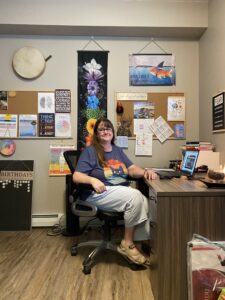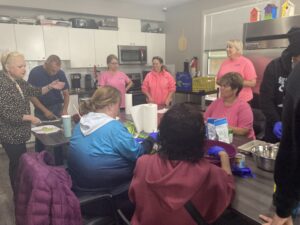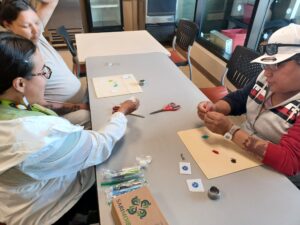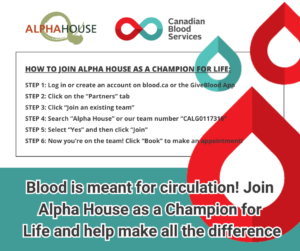A Road to Recovery
Shaundra Bruvall | September 13, 2024
Sober-Living at Alpha House’s Providence House
with Insights from Recovery Coach, Melodie

The road to recovery is a difficult journey—one that’s best traveled with community and supports at your side. Earlier this year, we transitioned one of our harm reduction buildings to our first ever sober-living supportive housing program – Providence House . Sober living aims to provide healthy environments conducive to sustained recovery by giving individuals the supports they need to find independence, reconnect with community, and improve their quality of life. We tracked down our supremely busy Recovery Coach, Melodie, to hear a little bit about her job supporting clients at Providence, the types of programming offered, and the day-to-day activities in the building.
A recovery coach is a mentor and motivator that supports individuals toward recovery by helping them navigate unique situations and challenges on their way to maintaining sobriety. Melodie describes her job as being a sort of a
“cheerleader for the clients – that might mean helping them with a specific task or having my door open and being available to talk when they need.”
Ultimately, it’s about supporting someone’s journey with encouragement and positive reinforcement.
A 9 AM group meeting with Melodie and all the residents in the building kicks off each new day at Providence, where together clients do their daily affirmations, discuss AA and other recovery programs, and share about the things they’re looking forward to, how they’re planning to connect with others, and what motivates them. An important reminder about recovery is that different approaches resonate with different people; it’s important to encourage interest in the approach that speaks to each individual person. After the morning meeting, clients go about their day, and Melodie keeps her office doors open for clients who are looking to chat, whether that’s to vent about a frustrating situation or to start working on a new goal they’ve set for themselves.
Which supports an individual needs looks different for everyone—one client might be looking to find volunteer opportunities or employment, while another could be looking to reconnect with their family now that they are sober. Everyone has their own goals and ambitions, and it’s critical to their success for us to surround our folks with encouragement and support for each milestone. Often times the barrier can be not knowing where to start or who to reach out to which is why we’re so grateful to have Melodie as a resource and support.
Recently, one of our clients has been looking to get visitation rights to see her child after 5 years apart— Melodie has been working with the client and the child’s caseworker to go through the steps of making those visitation rights happen, which includes advocating for the client and presenting the changes and improvements they have made while at Providence House. This is just one of many unique situations a Recovery Coach can help with.
When a new resident joins Providence House, they have an introductory meeting with the recovery coach so she can hear their story, learn more about them, and identify what areas they need support with. The beginning stages of sobriety can come with its own set of challenges: overwhelming emotions, physical withdrawal symptoms, or difficulty sleeping, eating, or concentrating. Another unique challenge that clients can face is the feeling of abandoning friends they’ve made while struggling with their addiction and who may still be on the street or actively using substances. Separating from those meaningful connections takes time to process and come to terms with. Understanding how difficult sobriety can be, relapse is also a real concern— one of the most helpful aspects of Alpha House’s sober-living program is how we are able to navigate someone’s relapse through the support of our Detox program. Clients who relapse in the program aren’t kicked out, rather they have the opportunity attend Alpha House’s Detox to withdrawal in a medically supported environment. Once they’ve completed the detox process, they can re-engage with the recovery coach and building managers to understand what happened and what they might need to change to find success in their recovery.
Melodie describes the vibe at Providence House as
“very welcoming— each individual is unique in their own ways, but everyone gets along, is engaged in programming, and does their best to welcome new residents.”
The breadth of programming available in the building gives individuals plenty of opportunity to engage with others, and with their own goals and plans. Sober-living and sobriety-based programming involves lots of meetings and group activities including 12-step AA programming. On Tuesdays, one of Alpha House’s Indigenous Peer Support workers stops by for weekly Wellbriety meetings, which is similar to a 12-step program, but with a focus on the teachings of the Medicine wheel. Wellbriety meetings are frequently followed by beadwork, where clients can express their creativity and receive the therapeutic benefits of working on a craft. The weekly sweat lodges that we do in our Detox program are also open to residents at Providence House, which some clients find integral to their recovery journey. There are also lots of spontaneous events that happen at the building put together by staff or other agencies like community cleanups, unique art therapy projects, BBQs, human bingo, gardening, painting bird houses, lawn games like beanbag tosses, and DIY banana split dessert making just to name a few!
Group programming can bring its own challenges though. Many of the individuals at Providence are transitioning from living on the street so attending group activities can come with a lot of anxiety, increased feelings of insecurity, and trauma responses. For example, an individual who transitioned from homelessness may not have access to the clothing they need to attend meetings and group activities in a way that makes them feel dignified. Lots of similar examples come up where the obstacle to engagement is not immediately apparent, but can cause significant challenges if left unaddressed.
After spending many years on the street, things like managing finances or doing laundry are skills that have been forgotten or have never been learned, and can act as barriers to independence. Tackling these challenges are among the first steps to supporting clients toward being able to live on their own. Melodie has taken steps to fill these gaps by facilitating budgeting classes, starting the process of helping clients get their driver’s licenses (we are on the book stage right now!), and working one-on-one with clients to develop their skillsets with day-to-day tasks like cooking, cleaning or laundry. During one-on-one sessions, Melodie has also been working with some of our clients on finding employment or volunteer opportunities. Providence currently has one client working full-time, two working part-time, and another handful who are volunteering in the community.
Clients also get to vote on programming activities, making sure they have a voice in the topics and activities planned.

What are the biggest differences we’ve seen from clients on their recovery journey to now?
Of course, differences are going to vary from person to person, but some overarching things we’ve seen are that clients are more hopeful about the future and their lives, and they talk of more— setting goals and finding things they want to achieve. We also see lots of clients confronting their pasts, coming to terms with lost jobs and housing, and making amends through attending court cases and reaching out to lost connections and family members. On top of that, there are improvements to both their mental and physical well-being, which are more general improvements that come with sobriety.
There’s been lots of positive feedback from staff and clients alike about Providence House and the Recovery Coach program here, and we’ve already seen lots of successes! We are really excited to have added a sober-living facility to our continuum of services and look forward to sharing more about our clients and staff and the community they’re creating soon.





